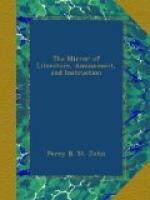“The town of Edmonton has lent the
stage
A Devil and a Witch, both in an age.”
says the prologue to this play, which is said to be founded on a known true story, and exhibits various witchcrafts practised upon the neighbourhood by one Mother Sawyer, whose portrait with that of her familiar (a dog, called Tom, which is one of the dramatis personae,) is in the title-page. In the last act, Mrs. Sawyer is led out to execution. Thus far Lysons.—Many curious particulars relating to Mrs. Sawyer may be seen in a quarto pamphlet, published in 1621, under the title, of The wonderful discoverie of Elizabeth Sawyer, a witch, late of Edmonton; her conviction, her condemnation, and death; together with the relation of the Divel’s accesse to her, and their conference together. Written by Henry Goodcole, Minister of the Word of God, and her continued visitor in the Goale of Newgate. The play of “The Merry Devil of Edmonton” was performed at the Globe, on the Bank-side. “The Witch of Edmonton” was often acted at the Cock-pit, in Drury-lane, and once at Court, with singular applause. It was never printed till the year 1658; and was composed by Rowley, Dekker, and Ford, as a tragi-comedy.
P.T.W.
* * * * *
Moody the Actor was an avaricious man. He once lent money to Mr. Brereton, the actor; Brereton did not return it immediately, and Moody waited with some degree of patience. At length, the first time Moody met him, he looked earnestly at him, and vented a kind of noise between a sigh and a groan. He repeated this interjection whenever he met Brereton, who at length was so annoyed, that he put his hand in his pocket and paid him. Moody took the money, and with a gentler aspect said, “Did I ask you for it, Billy?”—Speaking of Sheridan, Moody once said, “I have the highest respect for Mr. Sheridan; I honour his talents, and would do anything to show my friendship for him, but take his word.”—Taylor.
* * * * *
A Cruel Physiognomist.—Quin said of Macklin, “If God writes a legible hand, that fellow is a villain.” At another time, Quin had the hardihood to say to Macklin himself, “Mr. Macklin, by the lines—I beg your pardon, sir—by the cordage of your face, you should be hanged.”
* * * * *
“The Grand Pause.”—Macklin had three pauses in his acting—the first, moderate; the second, twice as long; but his last, or “grand pause,” as he styled it, was so long, that the prompter, on one occasion, thinking his memory failed, repeated the cue (as it is technically called) several times, and at last so loud as to be heard by the audience. At length Macklin rushed from the stage, and knocked him down, exclaiming, “The fellow interrupted me in my grand pause!”




